Pressure mounts on Government for ‘Hillsborough-style’ probe into Battle of Orgreave
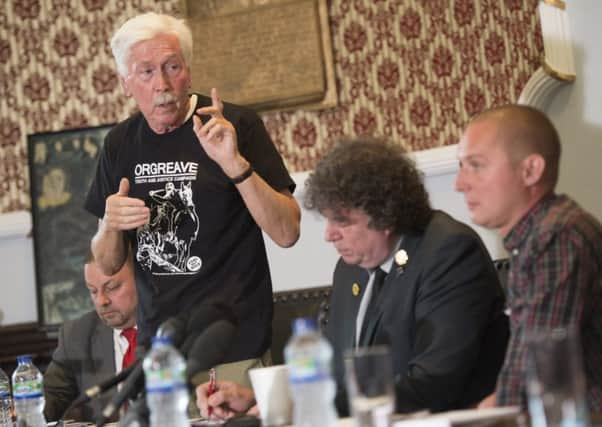

Campaigners have vowed to continue their calls for a full inquiry into the clashes between police and striking miners on June 18 and say they will now use more “imaginative” methods to draw attention to their cause.
The Independent Police Complaints Commission (IPCC) revealed yesterday that it would “not be in the public interest” to launch a full investigation into claims police used excessive force against miners, had their statements manipulated and gave false evidence in court to justify spurious criminal charges.
Advertisement
Hide AdAdvertisement
Hide AdThe watchdog’s review found evidence that senior officers became aware of perjury by their colleagues but did not want it to be revealed, something it said raised “doubts about the ethical standards of officers in the highest ranks at South Yorkshire Police at that time.”
But it said the “passage of time” meant allegations of assault of misconduct by police could not now be pursued, and that some were subject to complaints and civil proceedings at the time.
During a press conference held at the headquarters of the National Union of Mineworkers in Barnsley, Granville Williams, one of the founders of the Orgreave Truth and Justice Campaign (OTJC), said the two-and-a-half years the IPCC had spent on its scoping exercise had been a “cul-de-sac” for his group.
He called for an inquiry to be set up similar to the Hillsborough Independent Panel, which was formed in 2009 by then-Home Secretary Alan Johnson and exposed the scale of wrongdoing by police during Britain’s worst ever sporting disaster.
READ MORE...
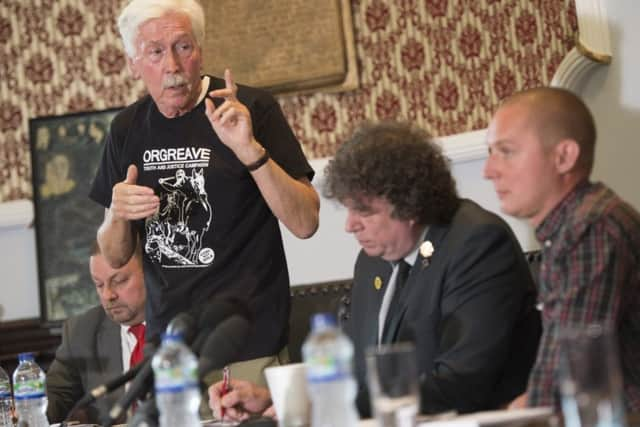

Advertisement
Hide AdAdvertisement
Hide AdDescribing the IPCC as a “flawed organisation”, he added: “We need a full public inquiry, this is what Hillsborough got. We need to remind ourselves that back in October 2012 it was the Hillsborough Independent Panel that showed the behaviour of South Yorkshire Police during the Hillsborough disaster.
“It is quite clear that while this seems like a set back for us it is end of a log-jam. It is getting something out of the way so we can say ‘we want a full public inquiry’.
“I think from today we have a clear road, we have been on a detour and we are back on the road.”
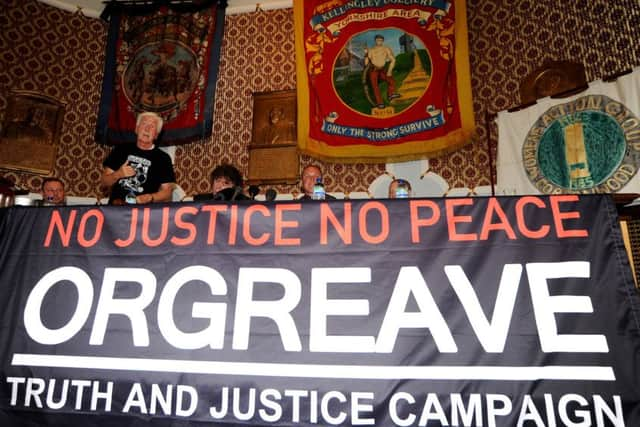

When asked whether a public inquiry was still worth pursuing more than three decades on he said: “I have been asked before, why bother? It is because of the burning injustice. You only have to talk to people about their lives’ work, about the closure of the pits.
Advertisement
Hide AdAdvertisement
Hide Ad“If you live out the mining community you don’t understand the harrowing destruction that took place. it is not going away and that is why it is important.”
OTJC chairman Joe Rollin said after the press conference: “We are not the first campaign organisation to say the IPCC is not not fit for purpose. Our reaction is that it is disappointing but not surprising. We never wanted the involvement of the IPCC in the first place.
“We have been very nice and a bit of a fluffy campaign so far, we have co-operated fully with the authorities. That is going to start to change. We are going to use some more imaginative measures and direct action to get ourselves in the press.
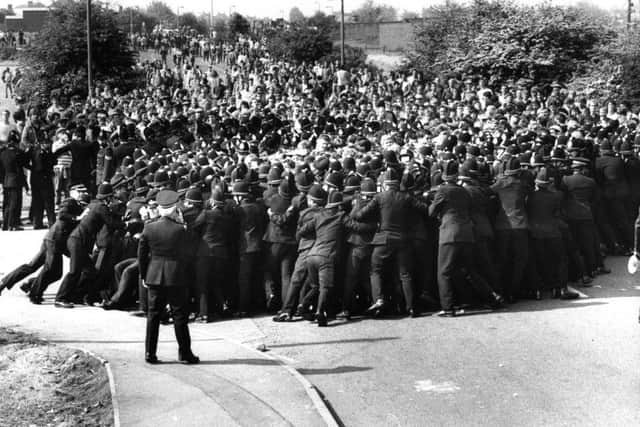

“We might have to start taking lessons from some of the more imaginative protest groups like Occupy and UK Uncut. We are not going to go away, we are going to make more noise if anything.
Advertisement
Hide AdAdvertisement
Hide Ad“The Hillsborough families never gave up. Working people have never been given justice on a plate, we have had to fight for it. I am looking forward to getting stuck in for the next few years.”
Kevin Horne, 66, from Mexborough, one of the miners arrested in the clashes with police, said the publicity generated by the IPCC’s refusal to investigate “could actually work in our favour”.
He said: “It is a public inquiry we wanted in the first place. It was the police that referred themselves to the IPCC, we think they only did it as a buffer to slow us down.
“It should have taken two-and-a-half weeks to say they can’t do anything and there are too many people to interview, not two-and-a-half years. It is a poor excuse. The IPCC are not fit for purpose.
Advertisement
Hide AdAdvertisement
Hide Ad“It took Hillsborough families more than 20 years so I think we can still achieve what we want to, which is a public inquiry.”
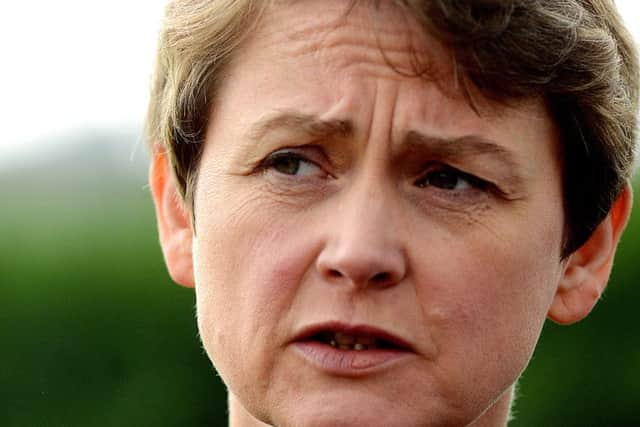

In the Battle of Orgreave 95 miners were arrested at the Orgreave coking plant, near Rotherham, on June 18, 1984, after clashes with police which left 50 people injured.
When the cases came to court, all were abandoned after it became clear that evidence provided by police was unreliable. South Yorkshire Police paid £425,000 in compensation to 39 pickets in out-of-court settlements.
South Yorkshire Police referred itself to the IPCC in 2012 after a BBC documentary claimed officers may have colluded in writing court statements which saw miners wrongly charged.
Advertisement
Hide AdAdvertisement
Hide AdThe Home Office said today that Theresa May would “carefully consider the findings of the IPCC’s review and will respond in due course”. A spokeswoman added that she would “consider any requests that she receives to set up a public inquiry into Orgreave”.
Unlike a formal, independent inquiry set up by the Government and led by a judge, any inquiry similar to the Hillsborough Independent Panel would not have the power to call witnesses but would be able to gather all available documentation.
Among those calling for the Government to launch an inquiry was Labour MP Andy Burnham, who as Culture Secretary lobbied for the Hillsborough panel to be set up in 2009, and Barnsley MP Michael Dugher.
Vera Baird, police commissioner for Northumbria, who worked on the Battle of Orgreave trial as a lawyer, said: “It has taken the IPCC two and a half years to find that this job is too big for them.
Advertisement
Hide AdAdvertisement
Hide Ad“The government should not now delay further but set up a Hillsborough-style panel to inquire fully into the wrongdoing which was evident to all those in the trial and is now essentially confirmed by the IPCC.”
South Yorkshire Police said the decision to revisit the claims would be made only if new evidence came to light, while the South Yorkshire Police Federation, which represents rank and file officers, said it was time to “move on”.
Police and crime commissioner Dr Alan Billings said the IPCC’s decision “is likely to satisfy no
one” as it would “not bring closure for the former miners, their families and communities”.
Advertisement
Hide AdAdvertisement
Hide AdBut he added: “I would understand why the former miners would want a thorough inquiry: they want to know the truth and they want closure after so many years.
“However, any such enquiry should not be allowed to be protracted and the costs would have to be borne by the national government and not fall on the present generation of South Yorkshire taxpayers.”
In its decision document released today, the IPCC ruled it would “not be in the public interest” to investigate the clashes between police and picketing miners at the height of the 1984-85 strike.
Its scoping exercise, launched in November 2012, looked into allegations that police used excessive force against miners, had their statements manipulated and gave false evidence in court to justify spurious criminal charges.
Advertisement
Hide AdAdvertisement
Hide AdThe watchdog’s review found evidence that senior officers became aware of perjury by their colleagues but did not want it to be revealed, something it said raised “doubts about the ethical standards of officers in the highest ranks at SYP at that time.”
But it said the “passage of time” meant allegations of assault of misconduct by police could not now be pursued, and that some were subject to complaints and civil proceedings at the time.
The IPCC’s deputy chair Sarah Green said: “Because the miners arrested at Orgreave were acquitted or no evidence offered, there are no miscarriages of justice due to alleged police failures for the IPCC to investigate.
“Allegations of offences amounting to minor assaults could not be prosecuted due to the passage of time; and as many of the police officers involved in events at Orgreave are retired, no disciplinary action could be pursued.”
Advertisement
Hide AdAdvertisement
Hide AdMembers of the Orgreave Truth and Justice Campaign (OTJC) group said they were “deeply disappointed” by the decision and suggested the IPCC was not the right organisation to look into the claims.
It said in a statement today: “The OTJC continues to gather increasing support from organisations and individuals for a full public inquiry into why it was that on 18 June 1984, 95 miners were arrested at Orgreave after thousands of police officers - many in riot gear, with others on horseback - brutally assaulted miners participating in a strike aimed at defending jobs and mining communities.
“An inquiry will help reveal exactly why, when the subsequent court cases took place, all of the charges, including riot were abandoned.
“It must inevitably lead to two things. Some officers being charged with a series of offences - assault, perjury, perverting the course of justice and misconduct in a public office. Secondly, a paper trail that would indicate that the actions of the police at Orgreave were influenced by political pressure from within the highest ranks of the Government of the day. The fight for truth and justice goes on.”
Advertisement
Hide AdAdvertisement
Hide AdIn its 20-page report setting out the reasons for its decision, a number of passages were redacted for what the watchdog described as “legal reasons”. As part of the exercise officials examined “many thousands of pages of documents, film and photographic material”.
The IPCC said National Union of Mineworkers officials had argued the events at Orgreave were “designed, and indeed orchestrated, so as to inflict a symbolic public defeat on the miners”.
It said: “These wider questions are beyond the remit of the IPCC. They could only be answered if there is a public inquiry or an exercise like the Hillsborough Independent Panel (HIP), which spent nearly three years examining documents relating to the disaster.
“Nothing in this report precludes such an exercise; indeed the lengthy work done in finding and reading documentation would provide a starting point for it.”
Advertisement
Hide AdAdvertisement
Hide AdIt added that an IPCC independent investigation would be “extremely challenging” as it involved “literally hundreds of police from forces all over the country”.
The report included an email sent to the IPCC in November 2012 from a witness to the clashes, who said: “I feel that this very serious incident was brushed under the carpet for 28 years. I, together with hundreds of miners, witnessed gross violence and falsehoods perpetrated by the state.”
The watchdog said it found “no direct evidence” of an agreement between police and the county prosecutor or others to manipulate evidence or manufacture charges.
Only circumstantial evidence was found to support the claim that the 6,000-plus pickets were ushered into a field as a deliberate strategy by the police or government “so that the NUM could be defeated in a decisive battle”
Advertisement
Hide AdAdvertisement
Hide AdIt also said there was no evidence senior South Yorkshire police officers encouraged their colleagues to commit perjury.
But it added: “It is, however, of particular concern that our review found evidence that the senior officers became aware, after the event, of instances of perjury by SYP officers but did not wish it to be disclosed.
“The unwillingness to disclose evidence of wrongdoing by officers does raise doubts about the ethical standards of officers in the highest ranks at SYP at that time.”
The IPCC said at the time of the clashes “the Government of the day was locked into a long and bitter industrial dispute with the NUM”.
Advertisement
Hide AdAdvertisement
Hide AdIt added: “The scale of the challenge of policing public protests and pickets over such a long period was significant. At the final confrontation at Orgreave on 18 June it was estimated that 6,000 police officers from the majority of UK forces were deployed, equipped with long shields and short shields, together with 42 police horses.
“The officer in charge on that day described his objective as being to ensure that the lorries were able to enter and leave the Orgreave coking plant and to uphold the rule of law. The pickets had attended in equal or greater numbers to the 6,000 or so police officers.”
It added: “The key issue to consider is whether it would be in the public interest to now investigate matters that occurred 30 years ago, applying the complaints regime as it now stands, using current resources, which would necessarily mean prioritising this over other matters that have occurred more recently and that reflect contemporary concerns about modern day policing.”
A full investigation, the IPCC said, would mean tracing and interviewing under caution hundreds of officers and speaking to up to 10,000 potential witnesses.
Advertisement
Hide AdAdvertisement
Hide AdIt said: “The IPCC has made concerted efforts to locate, recover and review documents, but the material that it has been able to obtain, on its own, cannot give a complete picture of what happened at Orgreave.
“This contrasts with the position in relation to the Hillsborough disaster where the HIP collected and analysed an immense amount of material.”
It said it would be difficult to obtain evidence that would meet the standard required by prosecutors, and because of the passage of time it would be possible to bring disciplinary proceedings against “vanishingly few” serving officers.
The report concluded: “In the circumstances, on the evidence thus far available, I have determined that, whilst the allegations are serious, it would not be in the public interest and so is unnecessary to now investigate the remaining matters raised in the first referral.”
Advertisement
Hide AdAdvertisement
Hide AdLabour MP Yvette Cooper said: “This decision lets down the Orgreave families and shows the weakness of the current system.
“It has taken the IPCC two-and-a-half years to decide not to investigate the events at Orgreave and to conclude that the big questions weren’t within their remit or resources.
“If they are too limited to do the job then someone else needs to. For too long there have been serious allegations about the way the miners were treated at Orgreave, but we have never had the truth.
“The coalfield communities have had nothing more than this limited report - and even that includes redactions which will raise even more concern.
Advertisement
Hide AdAdvertisement
Hide Ad“Its time for an independent inquiry, potentially modelled on the Hillsborough panel, to open up everything.
“This is also fresh evidence of the need to fundamentally reform the police complaints system so there is an organisation powerful and strong enough to undertake many investigations at once.
“The events at Orgreave were amongst the most troubling of the entire 1984-85 Miners’ Strike. Those who were there have distressing stories of violence.
“Those who weren’t saw the TV images of blooded faces, charging horses, of kicks and punches. The aftermath threw up more questions than answers. It’s time for the truth.”
READ MORE...